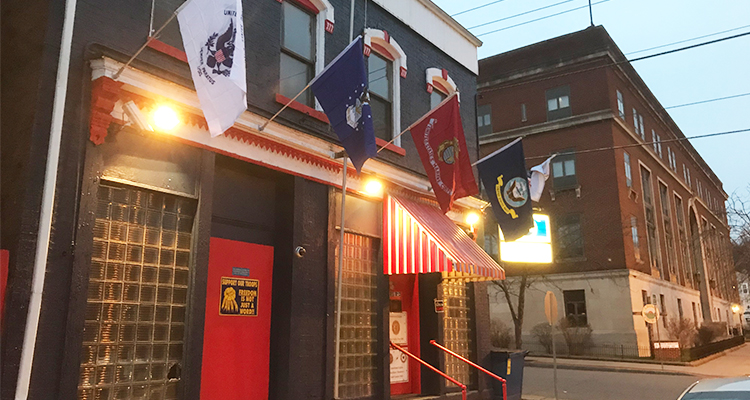Editor’s note: This week, Weelunk will pause our normally scheduled programming to highlight stories that feature Black narratives. We have chosen to take this time to amplify those voices that are so often silenced and celebrate all that the African American community has contributed to the city of Wheeling. Today’s story originally posted on Feb. 26, 2019.
When America’s Greatest Generation returned home from the battlefields of World War II, many flocked to veterans’ clubs such as the American Legion and the Veterans of Foreign Wars (VFW). These clubs not only promoted patriotism and honored the memory of those lost, but served as a place where veterans who had endured unimaginable hardship could surround themselves with those who understood what they had just been through.
However, for the hundreds of thousands of African-American veterans who had served their country, their welcome was uneven at best. Having served in segregated units during the war, these men and women returned — especially in the American South — to a society equally fractured by racial segregation. Such was the case in Wheeling, W.Va., in 1946 when a group of predominantly African-American veterans founded American Legion Post 89 at 1040 Chapline St.
“It was subtle,” said Post 89 First Vice Commander Ralph Edwards. “They had their own clique or niche, and we had ours. The two groups [Post 1 and Post 89] worked together and were friends, but they were definitely separate.”
In the 1940s, the two clubs were only a block away from one another, with the original Post 1 “Oldest Post of the American Legion” headquartered at 1119 Chapline St. where the new annex to the Federal Courthouse stands today. Though proximity to Post 1 may have been a factor in Post 89’s choice of original location, the 1000 block of Chapline Street was also a major corridor of Wheeling’s African-American community during segregation, with the Pythian Building, Lincoln School and the Beau Brummel Club all lining the block.
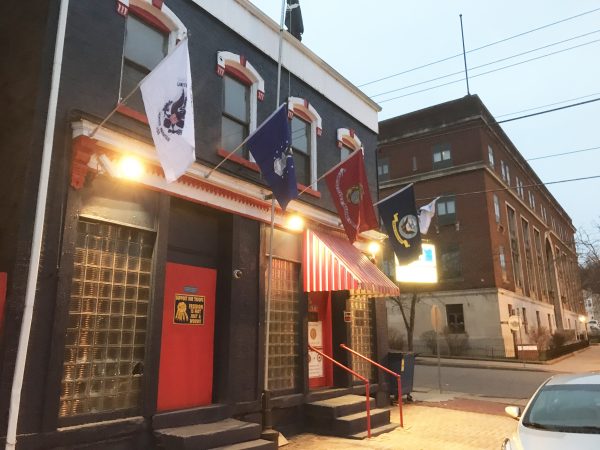
Within roughly a decade, both legions would be forced to move by the city’s short-lived urban renewal craze of the 1960s. Between 1959 and 1971, hundreds of buildings in Center, East and Downtown Wheeling were declared “blighted” and scheduled for demolition. This hit Wheeling’s African-American community especially hard, destroying not only their commercial and social centers, but their homes as well. The Chapline Street location of Post 89 was not spared the wrecking ball, and, by the dawn of the 1970s, the Legion had relocated to the current home at the corner of 15th and Jacob streets in East Wheeling.
It was at the 15th Street location in the early 2010s that Post 89 earned a certain degree of notoriety. Despite traditionally being a veteran’s organization, over time the Post had become lax in whom they let in and essentially welcomed any paying customer, regardless of membership in the Legion or veteran status. This, coupled with increased crime rates in East Wheeling, led to the corner of 15th and Jacob becoming a hotbed of commotion all hours of the night.
“The door was open to any and everyone,” said Post Commander Demetrius Lathon, a U.S Navy veteran. “We had a lot of out-of-towners here who just took over the place. It wasn’t an American Legion; it wasn’t about what the American Legion stands for.”
This downward trajectory made front-page news in October of 2015 with the murder of Lemroy Coleman, as a result of gunshots fired from the stoop of Post 89. The violence was reported to have resulted from an argument that began inside the Legion. By early 2017, the City of Wheeling was seeking to declare the Legion — which by that point was more of a bar — as a public nuisance and shut it down, citing the murder of Coleman as well as over 40 police calls involving the Post’s street corner in 2016.
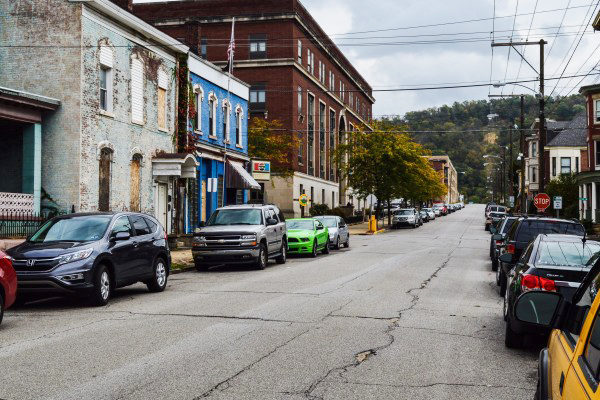
For longtime Post members like Edwards and Lathon, the decline of their organization had been heartbreaking.
“I’ve been a member for around 15 years,” Lathon said. “But when it started to fall off, I didn’t like what was going on and I took a step back. I even wrote a letter to the city, saying that if things don’t improve, they need to close it down. Lives were being lost, people were getting hurt, enough was enough. One life lost is too many.”
“I’ve been a member for around 15 years. But when it started to fall off, I didn’t like what was going on, and I took a step back. I even wrote a letter to the city, saying that if things don’t improve, they need to close it down. Lives were being lost, people were getting hurt, enough was enough. One life lost is too many.” — Demetrius Lathon
As pressure ramped up from the city and community to close the Legion down, Edwards and Lathon decided to team up and try to save the Post — not only from closure — but from the very issues that had led to calls for such action. As City Council considered recommendations from city administrators to shut the post down, Lathon, Edwards and other post members spoke in support of the Legion, and what it meant to them and the community.
“It wasn’t pleasant what we had to do,” Edwards said. “He [Lathon] told council, ‘Close it up! I won’t be associated with a place like that. If we can’t fix it, close it up.’ That man spoke from his heart.”
With the eventual support of the East Wheeling community, including American Legion Post 1 just a block away on 16th Street, the members of American Legion Post 89 were able to convince City Council that their post was not only savable, but worth saving. By that time, the Post was the only remaining historically African-American American Legion in the state; while during segregation most of West Virginia’s largest cities had predominantly black Legions, the others had either been absorbed into pre-existing posts or fizzled away altogether.
While the city ultimately allowed the Legion to remain open — in no small part due to its historical significance — strict guidelines were imposed on the Legion to ensure they could turn the place around. The Legion would have to close at 11 p.m. Sunday through Thursday, and at midnight on Friday and Saturday; Legion representatives would have to attend at least six of the 12 monthly East Wheeling Neighborhood Watch meetings each year; and the Legion would have to hire a “reputable” security guard for Thursday through Saturday nights to discourage large congregations of people on the sidewalk.
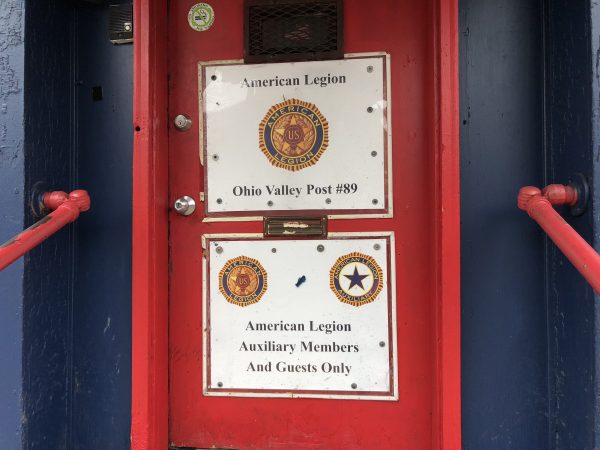
“The first thing we did was implement rules,” Lathon said. “Before, it was essentially an open-door policy; now it’s strictly members and guests only. We’re a non-profit, and it hurts us financially, but all we need to do is keep the lights on.”
“All money ain’t good money,” he added.
The changes were physical as well, including an overhaul of the interior and repainting of the exterior of the building.
“He and his wife have done a wonderful job of getting this place together,” Edwards said of the Lathons. “They’ve made it look like an American Legion again.”
One notable feature of the interior of the Legion is the POW/MIA table placed in a prominent area of the main room. The display serves as a way to memorialize those unable to join their comrades at the Legion, so those lost are not forgotten.
“Each item symbolizes something,” Lathon said. “The glass is inverted for those who aren’t able to toast with us anymore. The salt is sprinkled on the plate to symbolize their wounds. The red rose is for the love we have for them, and that they have for their country. The candle is to show the burning light, that they won’t be forgotten.”
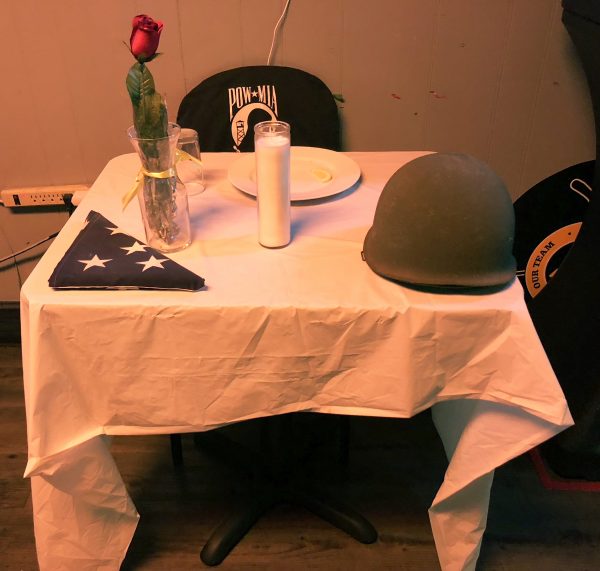
Today, the members of American Legion Post 89 — under the leadership of Commander Lathon and First Vice Commander Edwards — have kept true to the promises they made to City Council and the East Wheeling community. The corner of 15th and Jacob is quiet all hours of the day, and the Legion is committed to keeping it that way. Meanwhile, the Legion itself is striving toward excellence as a Post and is on track to be a “Gold Post” next year due to reaching various membership goals.
Adjacent to the Legion, Post 89 also owns the building known as the Doc Horton Youth Center. Robert “Doc” Horton was a microbiologist and member of Post 89 who served as director of the Ohio County Health Department lab, ensuring food safety standards. According to Lathon and Edwards, the Legion is working to apply for a grant to revamp the facility and offer an after-school program for the neighborhood’s kids.
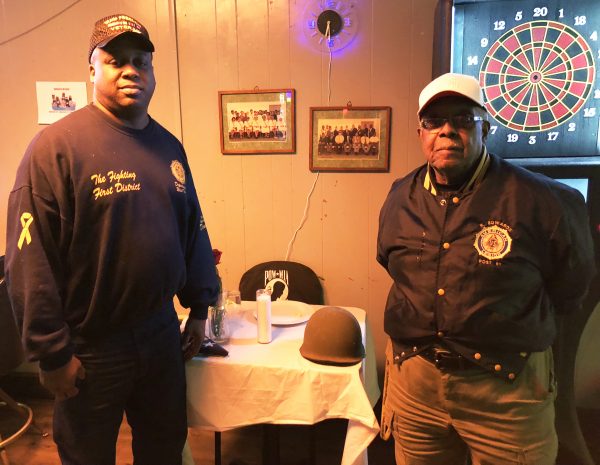
Keeping in mind the historical importance of the Legion and its longstanding presence in the neighborhood, Lathon is glad that the tradition of veterans serving veterans will remain at the corner of 15th and Jacob.
“To be the last predominantly African-American Legion in the state speaks volumes. When we pass it on, this will continue to be representative of what it is: an American Legion. A veteran can come in and enjoy themselves, not have to worry about anything, just relax with their fellow veterans. Any veteran can stop by — we’ve had some come in who have hit hard times — we’ve tried to give them money for a meal. That’s what being a veteran is all about.”
For Edwards, who served in the U.S. Army as a member of the 101st Airborne Division in the late 1950s and early 1960s, keeping the Legion open is a personal mission.
“I was born and raised here in East Wheeling. I’ve been a member of this Legion for over 40 years; I couldn’t let anyone close it down. We promised we’d turn it around, and that’s what we did.”
“I just hope we can continue to make the community proud,” Lathon added.
• Nick Musgrave is a self-described history geek living in Wheeling, W.Va. He is a graduate of Hastings College in Hastings, Nebraska, where he earned his bachelor’s degrees in history and political science. When not writing for Weelunk or uncovering cool stories about the past, he can often be found reading in his hammock or trying to brew the perfect cup of coffee.


